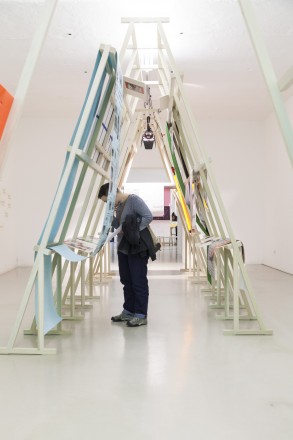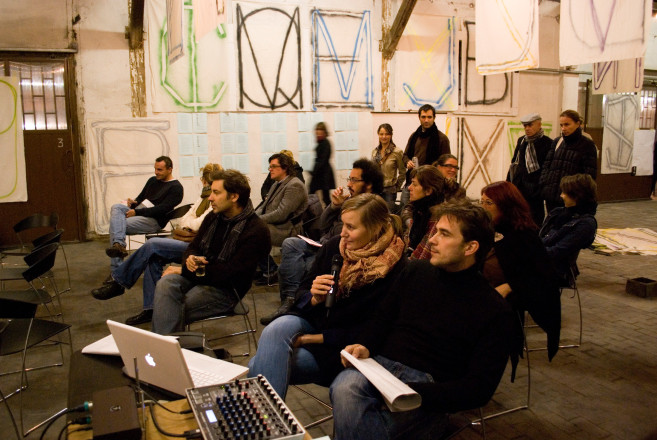Lungomare Residency 2020: Orizzontale
For the long-term artist in residency 2020 Lungomare invited the architectural collective orizzontale from Rome. The architects will focus during their residency on the public space of the city of Bolzano. The corona epidemic is putting this space into a temporary pause and is meticulously regulating its access rules. What better time than this to discuss the public space – which is so important for our living together – and to develop new scenarios for its future.
Orizzontale‘s work moves between architecture, landscape planning, art in public spaces and the production of homemade furniture for public spaces. The collective designs projects that pay particular attention to the interaction between residents and their urban common goods.
Lungomare
As a prelude to the artist in residency 2020, Angelika Burtscher and Daniele Lupo from Lungomare and the architects Margherita Manfra and Nasrin Mohiti Asli from orizzontale discussed last 29 April 2020 about the current condition of the public space during the corona epidemic.
You can watch and listen to the conversation as a video or audio track.
Language: italian
En plein air.
The artist in residency 2020 Lungomare with orizzontale started with three public acts. A series of practical exercises made to explore and re-inhabit the public spaces of the city of Bolzano.
The shock of the pandemic tamed us temporarily and put us in a status of pseudo-captivity. The public space was put into pause and thus also the possibility to use it, the freedom to inhabit it and to perceive it as a social meeting place.
For several weeks now we have been entering and meeting each other again in the public spaces and coexisting with its new rules that regulate mechanisms of inclusion and exclusion. The laws are there to draw physical and spatial boundaries and to control our behaviour. Barrier tapes are used to limit public spaces from use and floor patterns determine our movements and our “protected zones”.
Now is time to activate our thoughts and actions, we want to cross the threshold and move out of our comfort zone. We want to re-inhabit what surrounds us and perceive our right to the outside space.
Delimited space.
Protection or exclusion?
20.06.20 / 11.00 – 13.00 / Via Cagliari
As a first approach to get out of our captive state, we gave shape to a delimited environment.
With signal tapes a confrontation place was created to reflect on borders as zones of protection and exclusion.
With the participation of
Spazio autogestito 77 and Fridays for Future South Tyrol
Free spaces.
Possibility or denial?
20.06.20 / 16.00 – 18.00 / Alexander Langer Square (Lungotalvera)
During the second public act we reflected on the relationships that the city of Bolzano promotes and allows. We played with the social distancing rules and using a drawing instrument we measured and visualised the space. How can we interact with each other? In which spaces of the city can we be children?
with the participation of
Officine Vispa
Domestic and wild space.
Is there a balance?
20.06.20 / 21.00 – 22.30 / Piazza Università
The last act posed questions to the city of Bolzano and its inhabitants and produced a series of pictures (wishes). The collected fragments are a collection of impressions that the inhabitants of the city have shared with orizzontale. What kind of images are there of the city of Bolzano? Which images can we imagine?
In June 2020, when orizzontale travelled through the city of Bolzano after lockdown undertaking on- site research and meeting experts, the desire was born to revive public space and create tools for collective action.
Co-Carts are vehicles for the community. They can be attached to a bicycle, and their shape and function have the potential to change urban space.
Co-Carts are pop-up devices, built to be manipulated and transformed, to enter into synergy with each other and with their context and to amplify the relationship between the inhabitants and the city.
The installation of a megaphone amplifies protesting voices, giving important messages their necessary acoustic strength; Temporary exhibitions can be held on the vehicles, they are equipped with a table that invites you to do things together, a cinema screen for projections, a telescope that is both telescope and kaleidoscope, and flaps and doors that create a temporary space for action.
Co-Carts will be able to be rented and used by Bolzano citizens. To borrow them it will be necessary to share some basic values defined jointly by Lungomare, orizzontale and the other partners involved:
Co-Carts are eccentric, open, and anti-racist. They do not produce personal profit. They support inclusiveness, deconstructing existing categories, not only creating a space but celebrating it. Co-Cartspromote freedom of opinion, are multilingual, cross-cultural, and trigger discussion, debate, reactions. The Co-Carts are slow but agile, both quiet and noisy. They don’t disturb traffic but they do alter it, and with absolute certainty, they don’t emit exhaust gases! They are vehicles that open up new possibilities and stimulate the imagination.
For more info about the project > www.lungomare.org/co-carts
The Co-Carts will be built collectively from 17 to 21 October at the public workshop in the Lungomare garden.
Friday, 23. July 2021
6-9 pm
Since last year, due to the Covid-19 pandemic, the festival for the presentation of the Co-Carts project could not take place, we would now like to use this nice summer moment to present and celebrate the vehicles for the community in a Parade together with orizzontale and all project partners in the public spaces of the city of Bolzano.
The Co-Carts Parade will take place on Friday 23 July, starting at 18:00 at Lungomare, moving on to Piazzale Langer over to Ponte Talvera, to the green area near Roma-Bridge and ending at Mignone Park.
The Co-Carts Parade will be accompanied by the artist, singer-songwriter and performer Yomer, who will present the vehicles in a performative way. We invite all city residents and passers-by to join us to get to know the vehicles.
What´s on
EXHIBITION :: Binta Diaw :: Collective Practices – A Living Experience of Feeling ListenedAbout Lungomare
Lungomare, a cultural association founded in Bolzano in 2003, was created from the desire and necessity to open a space in which to share differences, experiences, opinions and desires, a space in which to make the link between cultural production and the political and social dimension. Lungomare undertakes projects that investigate and test possible relationships between design, architecture, urban planning, art and theory, the results of which are presented in different formats: public discussions, conferences, publications, exhibitions and interventions in public spaces. All these formats are characterised by the intention to interact with cultural and socio-political processes relating to the region in which Lungomare is located.
Currently Lungomare’s activities focus on long-term residency projects, a format whereby Lungomare invites guests to engage and interact within the context of South Tyrol. Lungomare’s activities are based on three principles: specific attention to the context in which the association’s projects are undertaken, the transdisciplinary approach that distinguishes these projects, and reflection on the role of Lungomare as a cultural institution in connection with the region in which it operates.
Territory
Lungomare is located at the edge of Bolzano, the capital of South Tyrol, and relates to the context in which it operates, attempting to highlight the dynamics of change. Large urbanized areas alternate with broad areas of intensive cultivation and yet others of picturesque landscape, all of which penetrate the centre of the city. The city is surrounded by mountains and this is one of the reasons why the tourism industry has become a driving force in this locality. The demographic structure of the city has been characterized for a long time by the coexistence of two populations, those speaking German and those speaking Italian. However, the social and demographic composition of Alto Adige Südtirol is changing. Migrants, including those from non-European countries are making their way to the area to settle, whilst others, including political refugees, are flowing through the region.



